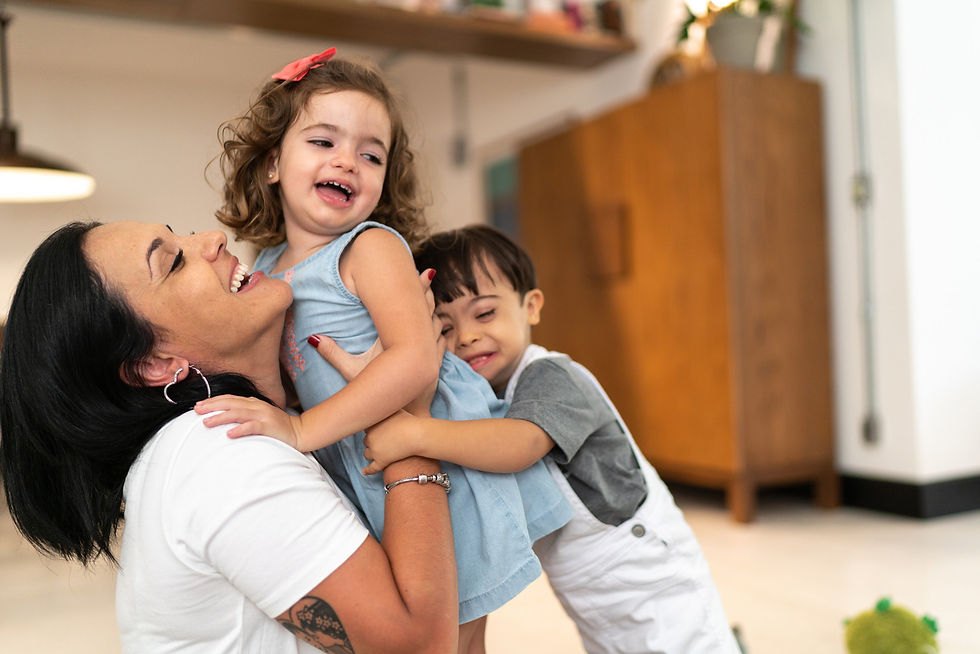How to Raise Grateful Children
- catherinejdietrich
- Oct 10, 2021
- 3 min read
Teaching our kids their “Pleases and Thank Yous” is one of the earliest things we do as parents and child carers. But there’s more to being grateful than good manners. Studies show that gratitude is strongly and consistently associated with greater happiness. Harvard Health says that “gratitude helps people feel more positive emotions, relish good experiences, improve their health, deal with adversity, and build strong relationships.” Which is exactly what we want for our children!
But how do we model this in their lives so that it becomes second nature to them? We have a few ideas.

As always, what we do is much more powerful than what we say. Taking an active approach to cultivating gratitude in our own lives is the surest way to encourage our little ones to do that same - and as a bonus, you will reap the rewards as well. Consider taking a few minutes each day to write down five to ten things you’re grateful for, and before you know it you will start to see them everywhere. Your family will pick up on this by osmosis.
2. Set an example
Make a point of saying "thank you” as often as possible, especially in front of your children. Say it to service providers, wait staff in restaurants, the lady at the supermarket checkout, and your husband when he tops up your wine glass at the dinner table. Look the person you’re thanking in the eye as you say it, and show what it is to express genuine appreciation.
3. Show them what appreciation feels like
Perhaps most importantly, say “thank you” to your kids. When ever they help to unpack the dishwasher, make their bed, are ready to leave the house on time, or do something small that pleases you. It’s easy to forget this detail, but making our children feel appreciated will show them first hand how good it feels, which means they’ll want to model that behaviour for others.

4. Talk about gratitude
While you’re having dinner in the evenings, make gratitude a topic of conversation. Ask each child what happened in the day that made them feel grateful and share your own gratitude list. You could take this a step further in his book “How to Raise Kind Kids”, Thomas Likona suggests, “You could think about everyone at every stage whose work went into the meal you are eating — the farmers and harvesters, the truck drivers, the grocery store staff, all the way up to the cook.” This is a fun way to give your children some perspective on how much work went into the dinner they were tempted to complain about eating!
5. Take the “No Complaints Challenge”
Speaking of which, why not commit as a family to going 24 hours without complaining - about anything. Make up a code word that anybody can call out if they hear any complaining, and make it a game to see who manages the longest. Afterwards, discuss the challenge - how did it go? How did it make you all feel? What did you learn? Did you miss complaining - or did you realise that there might be other ways to deal with disappointment?
6. Call out kind behaviour
Every time you notice generosity, kindness, or somebody going above and beyond for another person, point it out to your kids. This could be when you see it in your social circle, when it happens in a TV show you’re watching together, and - most especially - when you notice it coming from your own family members. Giving your children a vocabulary for kindness is to give them a powerful tool to help them not only to model it, but also to notice it when they experience it for themselves.

7. Find fun ways to say “thanks!”
Encourage your children to think of people who help them - from friends at school to teachers to coaches to the guys at the recycling centre. Then come up with some fun ways to thank them together - perhaps they’d like to drop off a batch of home-made cookies, draw somebody a picture, or make them a bracelet from beads. Gratitude is a gift that should be shared as often as possible!
Be mindful that all children have different ways of expressing their emotions, and that their way of saying “thank you” might be different from your own - or from any of the ideas we’ve had here. We’d love to hear from you with your children’s ideas for expressing gratitude.
Good People is a domestic staffing agency specialising in introducing high quality household assistance. We provide a simple, fast and professional service to recruit trained and vetted staff who match your family values. To discuss what we can do for you, or to join the Good People Club, get in touch today.



Comments